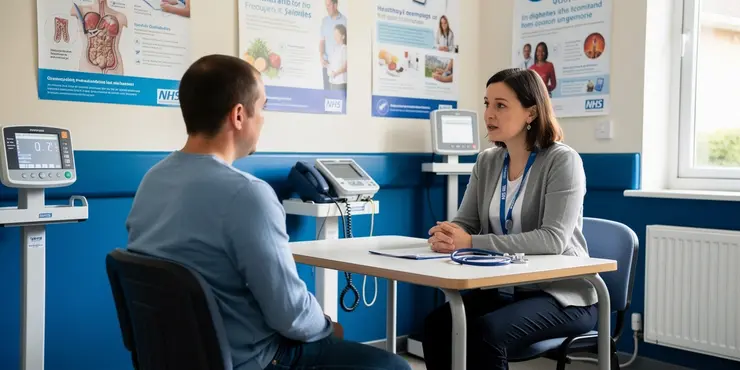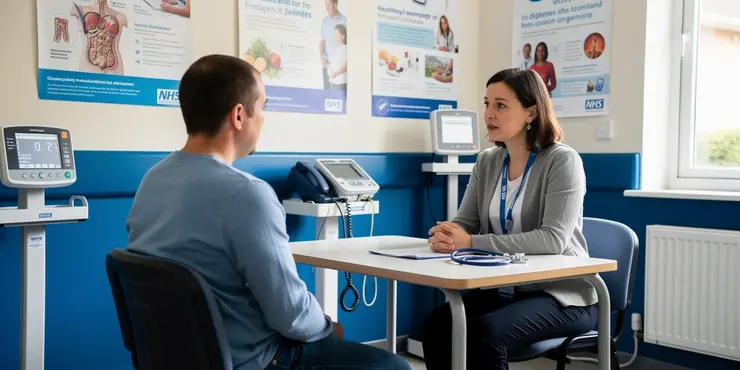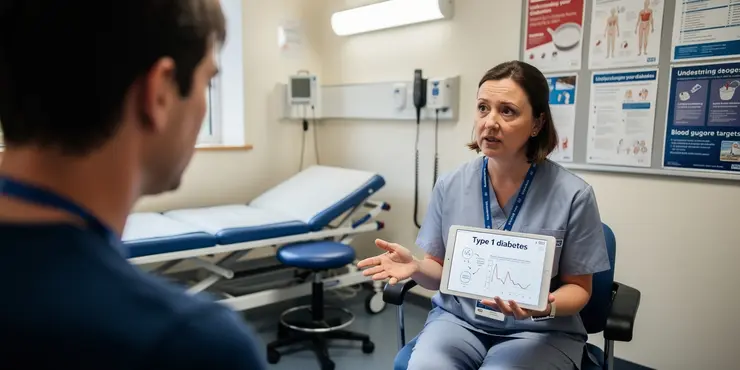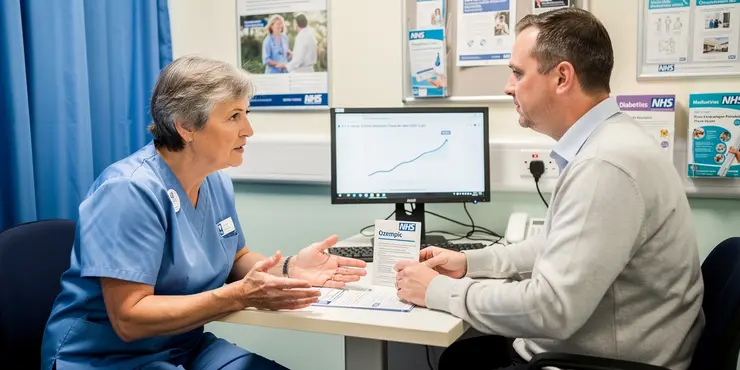
Find Help
More Items From Ergsy search
-

Is Ozempic suitable for type 1 diabetes?
Relevance: 100%
-

Can I take Ozempic with other diabetes medications?
Relevance: 75%
-

What is Ozempic?
Relevance: 66%
-

Is Wegovy used for type 2 diabetes management?
Relevance: 66%
-

What is Ozempic?
Relevance: 65%
-

Is Ozempic a form of insulin?
Relevance: 64%
-

Who should not take Ozempic?
Relevance: 63%
-

Is Ozempic safe for everyone to use?
Relevance: 62%
-

How does Ozempic work?
Relevance: 62%
-

Type 1 Diabetes supporting adults to manage Type 1 diabetes
Relevance: 60%
-

Is there a risk of thyroid tumors with Ozempic?
Relevance: 60%
-

Can Ozempic affect vision?
Relevance: 59%
-
What is type 1 diabetes?
Relevance: 59%
-

Is Type 2 Diabetes hereditary?
Relevance: 59%
-

What is type 1 diabetes?
Relevance: 59%
-

Do I need a prescription for Ozempic?
Relevance: 58%
-

How does Ozempic affect blood sugar levels?
Relevance: 58%
-

What Is Type 2 Diabetes? | 2 Minute Guide | Diabetes UK
Relevance: 57%
-

Are there warnings about using Ozempic with other medications?
Relevance: 57%
-

Does Ozempic have an impact on kidney function?
Relevance: 57%
-

Are there any long-term effects of using Ozempic?
Relevance: 57%
-
What is the difference between type 1 and type 2 diabetes?
Relevance: 57%
-

What happens if I stop taking Ozempic or Wegovy?
Relevance: 57%
-

How is Ozempic administered?
Relevance: 57%
-
Is there a genetic predisposition to type 1 diabetes?
Relevance: 56%
-

How does Ozempic help with weight loss?
Relevance: 56%
-

What causes Type 2 Diabetes?
Relevance: 56%
-

How often do you take Ozempic?
Relevance: 56%
-

Can Type 2 Diabetes go away?
Relevance: 56%
-

Can Type 2 Diabetes be prevented?
Relevance: 56%
-

Can Ozempic be used for weight loss?
Relevance: 55%
-

What are the symptoms of Type 2 Diabetes?
Relevance: 55%
-

How is Type 2 Diabetes diagnosed?
Relevance: 55%
-

Will insurance cover Ozempic for weight loss?
Relevance: 55%
-

How to manage type 2 diabetes
Relevance: 55%
-

Are there any serious risks associated with Ozempic?
Relevance: 55%
-

What are the common side effects of Ozempic?
Relevance: 55%
-

Has Ozempic been approved for weight loss?
Relevance: 55%
-

What are the side effects of Ozempic?
Relevance: 54%
-

Does insurance cover Ozempic?
Relevance: 54%
Introduction to Ozempic
Ozempic is a medication that has been widely discussed in the context of managing diabetes. It is known for its active ingredient, semaglutide, which is a GLP-1 receptor agonist. This class of drugs mimics the action of the glucagon-like peptide-1, a hormone that stimulates insulin secretion in response to eating. However, understanding the suitability of Ozempic for different types of diabetes is crucial, especially for those dealing with type 1 diabetes.
What is Type 1 Diabetes?
Type 1 diabetes is a chronic condition where the pancreas produces little or no insulin due to an autoimmune destruction of the insulin-producing beta cells. Insulin is a hormone vital for allowing glucose to enter cells and produce energy. People with type 1 diabetes require lifelong insulin therapy to manage blood sugar levels.
Use of Ozempic in Diabetes
Ozempic has been approved for use primarily in individuals with type 2 diabetes. It works by enhancing insulin secretion, suppressing the appetite, and reducing blood sugar levels which can help in weight management. It is administered as a weekly injection and is considered effective in managing glucose levels in type 2 diabetes patients when combined with lifestyle changes such as diet and exercise.
Is Ozempic Suitable for Type 1 Diabetes?
Despite its effectiveness in type 2 diabetes, Ozempic is currently not approved for the treatment of type 1 diabetes. The underlying reason is that type 1 diabetes involves an absolute deficiency of insulin due to the destruction of insulin-producing cells. Since Ozempic relies on the presence of functional beta cells to stimulate insulin release, it cannot be effective in individuals with type 1 diabetes who lack these beta cells.
Furthermore, the treatment of type 1 diabetes fundamentally requires insulin therapy to ensure adequate glucose uptake by cells, something that Ozempic cannot provide. Current management strategies for type 1 diabetes focus on insulin therapy alongside glucose monitoring, lifestyle modifications, and education to manage the condition effectively.
Conclusion
While Ozempic offers significant benefits for people with type 2 diabetes, its use in type 1 diabetes is not recommended. Individuals with type 1 diabetes should consult their healthcare provider to determine the most appropriate treatment plan, focusing on insulin therapy and continuous monitoring to maintain optimal blood glucose levels. As medical research advances, it remains crucial to stay updated with any new developments in diabetes management.
What is Ozempic?
Ozempic is a kind of medicine people talk about when dealing with diabetes. It has something in it called semaglutide. This helps your body make more insulin when you eat. Insulin is important for people with diabetes. We need to know if Ozempic works for different types of diabetes, like type 1 diabetes.
What is Type 1 Diabetes?
Type 1 diabetes is when your body cannot make insulin because some important cells are not working. Insulin helps sugar from food go into your body’s cells to make energy. People with type 1 diabetes need to take insulin for the rest of their lives to stay healthy.
How is Ozempic Used?
Ozempic is mainly used for people with type 2 diabetes. It helps the body make more insulin, makes people less hungry, and lowers blood sugar. This can also help people lose weight. Ozempic is a shot you take once a week. It works well for type 2 diabetes when people also eat healthy and exercise.
Can People with Type 1 Diabetes Use Ozempic?
Right now, Ozempic is not used for type 1 diabetes. People with type 1 diabetes do not have the cells that Ozempic needs to work. Ozempic helps the body make more insulin, but people with type 1 diabetes need to get insulin from medicine. They do not have enough insulin because some cells in their body do not work.
People with type 1 diabetes must use insulin medicine to keep their blood sugar at the right level. They also need to check their blood sugar, eat healthy, and learn how to take care of their diabetes.
What Should You Do?
Ozempic is good for people with type 2 diabetes, but not for type 1 diabetes. If you have type 1 diabetes, talk to your doctor about what is best for you. They can help you with the right medicine and tell you how to check your blood sugar. Learning about diabetes is very important. There might be new medicines in the future, so stay informed.
Frequently Asked Questions
What is Ozempic?
Ozempic is a medication used to improve blood sugar control in adults with type 2 diabetes.
Is Ozempic suitable for type 1 diabetes?
No, Ozempic is not approved for use in individuals with type 1 diabetes.
How does Ozempic work?
Ozempic works by mimicking the action of GLP-1, a hormone that increases insulin secretion in response to meals.
Can Ozempic be used to treat type 1 diabetes?
Ozempic is not indicated for the treatment of type 1 diabetes.
Why is Ozempic not suitable for type 1 diabetes?
Ozempic requires functioning pancreatic beta cells, which are absent or minimal in type 1 diabetes.
What is the primary treatment for type 1 diabetes?
The primary treatment for type 1 diabetes is insulin therapy.
Has Ozempic been tested for type 1 diabetes?
Ozempic has not been approved for use in type 1 diabetes, as its efficacy and safety have not been established for this condition.
What are common side effects of Ozempic?
Common side effects of Ozempic include nausea, vomiting, diarrhea, and abdominal pain.
Can Ozempic help with weight loss?
While not its primary indication, Ozempic may aid in weight loss in some patients with type 2 diabetes.
Is it safe for type 1 diabetics to try Ozempic off-label?
It is not recommended for type 1 diabetics to use Ozempic off-label without consulting a healthcare provider.
How is Ozempic administered?
Ozempic is administered once weekly via subcutaneous injection.
What should type 1 diabetes patients use instead of Ozempic?
Type 1 diabetes patients should focus on insulin therapy and other treatments as advised by their healthcare provider.
Does Ozempic directly lower blood glucose levels in type 1 diabetes?
No, Ozempic is not effective in directly lowering blood glucose levels in type 1 diabetes.
Is Ozempic a form of insulin?
No, Ozempic is not insulin; it is a GLP-1 receptor agonist.
Could Ozempic replace insulin therapy for type 1 diabetes?
No, insulin therapy is essential and cannot be replaced by Ozempic in type 1 diabetes.
Are there any risks in using Ozempic for type 1 diabetes?
Using Ozempic for type 1 diabetes without proper guidance may result in inadequate blood sugar control and other risks.
What are emerging treatments for type 1 diabetes?
Emerging treatments include advances in insulin delivery and islet cell transplantation research.
Should type 1 diabetes patients monitor for side effects if prescribed Ozempic?
Patients should monitor for side effects of any medication, but Ozempic isn't recommended for type 1 diabetes.
Is Ozempic covered by insurance for type 1 diabetes?
Usually, Ozempic is not covered for type 1 diabetes as it is not indicated for this use.
What are effective type 1 diabetes management strategies?
Effective strategies include careful monitoring of blood glucose, maintaining a healthy diet, regular exercise, and adhering to insulin therapy.
What is Ozempic?
Ozempic is medicine. It helps people with a sickness called diabetes. Diabetes makes it hard for your body to control sugar. Ozempic can help keep sugar levels healthy.
If you find reading hard, you can:
- Use pictures to help understand.
- Ask someone to read with you.
- Use tools that read out loud.
Ozempic is a medicine. It helps grown-ups with type 2 diabetes keep their blood sugar in check.
Can people with type 1 diabetes use Ozempic?
Ozempic is a medicine. It helps people with type 2 diabetes. If you have type 1 diabetes, ask your doctor if Ozempic is right for you.
Here are some tips to help you understand better:
- Ask a family member or friend to read this with you.
- Use a dictionary or online tool to look up hard words.
- Talk to your doctor or nurse if you have questions.
No, doctors do not approve using Ozempic for people with type 1 diabetes.
How does Ozempic work?
Ozempic is a medicine that helps you stay healthy. It helps your body use sugar in the right way. It can also help you keep your weight healthy.
If you have trouble reading, you can:
- Ask someone to read it with you.
- Use a reading app to help you understand.
- Break the text into smaller parts to make it easier.
Ozempic is a medicine that helps your body make more insulin after you eat.
Can Ozempic help people with type 1 diabetes?
Ozempic is a medicine. It helps people with type 2 diabetes. It lowers blood sugar. Ozempic is not used for type 1 diabetes.
If you have type 1 diabetes, talk to your doctor. They can give you the right medicine. You can also use tools like blood sugar meters. They help you check your blood sugar levels.
Ozempic is not used to treat type 1 diabetes.
Why Can't People with Type 1 Diabetes Use Ozempic?
Ozempic is a medicine for diabetes, but it's not for type 1 diabetes. Type 1 diabetes is when your body can't make any insulin. People with type 1 diabetes need insulin shots to stay healthy. Ozempic helps with a different kind of diabetes called type 2. Always talk to your doctor about what medicine is right for you.
If it's hard to read, try these tips:
- Ask someone to read with you.
- Use your finger to follow the words.
- Read out loud to help understand.
Ozempic needs working beta cells in the pancreas. People with type 1 diabetes don’t have these cells.
How do you treat type 1 diabetes?
The main way to treat type 1 diabetes is to use insulin medicine.
If you have type 1 diabetes, you will need to take insulin to stay healthy.
You can get help from a doctor or nurse with your insulin treatment.
They will help you learn how to use it and what amount you need.
Has Ozempic been tested for type 1 diabetes?
Ozempic is a medicine for people with diabetes. It has been tested for type 2 diabetes, but not for type 1 diabetes.
If you have type 1 diabetes, talk to your doctor about the best treatment for you.
Here are some helpful things you can do:
- Ask your doctor questions if you are not sure about your treatment.
- Use pictures or drawings to understand your treatment better.
- Bring a friend or family member to the doctor with you for support.
Ozempic is not okay to use for people with type 1 diabetes. We do not know if it works well or is safe for them.
What are the usual side effects of Ozempic?
Here are some side effects you might get from taking Ozempic:
- You might feel sick or get a tummy ache.
- You could have a headache.
- Your tummy might feel uncomfortable, like being gassy.
- You might feel weak or tired.
If you're worried or don't feel well, it's a good idea to talk to a doctor or nurse.
Having a notebook to write down how you feel can be helpful.
Using a calendar to track when you take your medicine can also help.
Ozempic can make you feel sick. Some common side effects are feeling like you need to throw up, actually throwing up, having a runny tummy, and tummy aches.
Can Ozempic help you lose weight?
Ozempic is a medicine. It is for people with type 2 diabetes. Sometimes it can help people lose weight.
Can people with type 1 diabetes safely use Ozempic?
If you have type 1 diabetes, do not take Ozempic without talking to your doctor.
How do you take Ozempic?
Here is a simple way to take Ozempic.
Ozempic is a medicine you use with a needle. You put the needle in your skin. You or a helper can do this once a week. Ask your doctor or nurse for help. They can show you how to do it.
Having a calendar can help remind you when it is time to take Ozempic.
If you have trouble, you can use pictures or videos that show each step.
You take Ozempic once a week. A doctor or nurse gives it to you with a small needle under the skin.
What can people with type 1 diabetes use instead of Ozempic?
If you have type 1 diabetes, ask your doctor what medicine is best for you.
Some people use insulin. Insulin helps control blood sugar.
Remember to talk with your doctor. They can tell you what you need. Tools like sugar meters or apps can also help you keep track of your sugar levels.
People with Type 1 diabetes need to take insulin. This helps keep them healthy. They should listen to their doctor for other treatments.
Does Ozempic lower blood sugar in type 1 diabetes?
No, Ozempic does not help lower blood sugar in people with type 1 diabetes.
Is Ozempic a type of insulin?
No, Ozempic is not insulin.
It is medicine for people with diabetes.
It helps to lower blood sugar.
If you have questions, you can ask your doctor or nurse.
You can also use pictures or videos to help understand.
No, Ozempic is not a type of insulin. It is a medicine that helps your body use insulin better. It is called a GLP-1 receptor agonist.
Can Ozempic replace insulin for people with type 1 diabetes?
No, people with type 1 diabetes need insulin. Ozempic cannot take the place of insulin.
Can using Ozempic be risky for people with type 1 diabetes?
People with type 1 diabetes should talk to their doctor before using Ozempic. Ozempic is usually for type 2 diabetes.
Here are some tools that can help:
- Ask your doctor questions.
- Use simple words in a health app to learn more.
- Have a friend or family member help you understand.
Using Ozempic for type 1 diabetes without help from a doctor can lead to poor blood sugar control and other problems.
What new treatments are there for type 1 diabetes?
If you have type 1 diabetes, your body can't make insulin. Insulin helps your body use sugar for energy.
Here are some new ideas doctors are trying to help:
- Insulin Pumps: A small machine that gives you insulin all day. It helps keep your sugar levels normal.
- Artificial Pancreas: A system that checks your sugar levels and gives you insulin when you need it. It's like having a real pancreas.
- Smart Pens: Pens that help you give the right amount of insulin. They have tiny computers inside.
- Beta Cell Transplants: Doctors put new cells in your body that can make insulin. It's still being tested.
These methods are still being studied. It's important to talk to your doctor about what might work best for you.
Here are some tools to help:
- Ask your doctor to explain things clearly.
- Use picture charts to understand your treatment plan.
- Use apps that remind you to take insulin.
New treatments are getting better. Now, we have better ways to give people insulin and there is research about moving special cells called islet cells into people to help them.
Do People with Type 1 Diabetes Need to Watch for Side Effects with Ozempic?
If you have type 1 diabetes and your doctor gave you a medicine called Ozempic, you should pay attention to how you feel. This is called watching for side effects.
Side effects are changes in your body that might happen because of the medicine. Some side effects can make you feel unwell. Tell your doctor if you feel anything different after taking the medicine.
Here are some things you can do to help:
- Keep a journal: Write down how you feel every day after taking the medicine.
- Talk to your doctor: If you feel different or unwell, tell your doctor right away.
- Get support: Ask a family member or friend to help you keep track of how you feel.
It is important to be careful and let your doctor know if you feel funny or sick. They are there to help you.
People should watch out for any bad effects from medicine. But, Ozempic is not for people with type 1 diabetes.
Will my insurance pay for Ozempic if I have type 1 diabetes?
If you have type 1 diabetes, ask your doctor if Ozempic is right for you.
See if your insurance will pay for the medicine. You can call your insurance company. Ask, "Do you cover Ozempic for people with type 1 diabetes?"
If it’s hard to read, you can ask someone for help. You can also use tools like text-to-speech to read the information out loud.
Ozempic is a medicine. It is usually not paid for by insurance for people with type 1 diabetes because it is not made for them.
How can you take care of type 1 diabetes?
Here are some tips to help manage type 1 diabetes:
- Check your blood sugar often. This helps you know how you are doing.
- Take your insulin as the doctor says. It helps keep your blood sugar level right.
- Eat healthy meals. Try to have a mix of vegetables, fruits, and proteins.
- Exercise regularly. This can help you feel good and keep your blood sugar stable.
- Talk to a doctor or nurse for advice. They can help you make a good plan.
Tools that might help:
- Use a blood sugar monitor. This shows if your blood sugar is high or low.
- Try phone apps or diaries to track what you eat and your sugar levels.
Remember to ask for help if you need it. Family and friends can support you too.
To feel better, it helps to:
- Check your blood sugar often.
- Eat healthy foods.
- Exercise regularly, like playing or walking.
- Follow your doctor's advice on insulin.
You can use reminder apps or calendars to help you stay on track. Ask a grown-up or a friend for support if you need help.
Useful Links
This website offers general information and is not a substitute for professional advice.
Always seek guidance from qualified professionals.
If you have any medical concerns or need urgent help, contact a healthcare professional or emergency services immediately.
Some of this content was generated with AI assistance. We’ve done our best to keep it accurate, helpful, and human-friendly.
- Ergsy carfully checks the information in the videos we provide here.
- Videos shown by Youtube after a video has completed, have NOT been reviewed by ERGSY.
- To view, click the arrow in centre of video.
- Most of the videos you find here will have subtitles and/or closed captions available.
- You may need to turn these on, and choose your preferred language.
- Go to the video you'd like to watch.
- If closed captions (CC) are available, settings will be visible on the bottom right of the video player.
- To turn on Captions, click settings .
- To turn off Captions, click settings again.
More Items From Ergsy search
-

Is Ozempic suitable for type 1 diabetes?
Relevance: 100%
-

Can I take Ozempic with other diabetes medications?
Relevance: 75%
-

What is Ozempic?
Relevance: 66%
-

Is Wegovy used for type 2 diabetes management?
Relevance: 66%
-

What is Ozempic?
Relevance: 65%
-

Is Ozempic a form of insulin?
Relevance: 64%
-

Who should not take Ozempic?
Relevance: 63%
-

Is Ozempic safe for everyone to use?
Relevance: 62%
-

How does Ozempic work?
Relevance: 62%
-

Type 1 Diabetes supporting adults to manage Type 1 diabetes
Relevance: 60%
-

Is there a risk of thyroid tumors with Ozempic?
Relevance: 60%
-

Can Ozempic affect vision?
Relevance: 59%
-
What is type 1 diabetes?
Relevance: 59%
-

Is Type 2 Diabetes hereditary?
Relevance: 59%
-

What is type 1 diabetes?
Relevance: 59%
-

Do I need a prescription for Ozempic?
Relevance: 58%
-

How does Ozempic affect blood sugar levels?
Relevance: 58%
-

What Is Type 2 Diabetes? | 2 Minute Guide | Diabetes UK
Relevance: 57%
-

Are there warnings about using Ozempic with other medications?
Relevance: 57%
-

Does Ozempic have an impact on kidney function?
Relevance: 57%
-

Are there any long-term effects of using Ozempic?
Relevance: 57%
-
What is the difference between type 1 and type 2 diabetes?
Relevance: 57%
-

What happens if I stop taking Ozempic or Wegovy?
Relevance: 57%
-

How is Ozempic administered?
Relevance: 57%
-
Is there a genetic predisposition to type 1 diabetes?
Relevance: 56%
-

How does Ozempic help with weight loss?
Relevance: 56%
-

What causes Type 2 Diabetes?
Relevance: 56%
-

How often do you take Ozempic?
Relevance: 56%
-

Can Type 2 Diabetes go away?
Relevance: 56%
-

Can Type 2 Diabetes be prevented?
Relevance: 56%
-

Can Ozempic be used for weight loss?
Relevance: 55%
-

What are the symptoms of Type 2 Diabetes?
Relevance: 55%
-

How is Type 2 Diabetes diagnosed?
Relevance: 55%
-

Will insurance cover Ozempic for weight loss?
Relevance: 55%
-

How to manage type 2 diabetes
Relevance: 55%
-

Are there any serious risks associated with Ozempic?
Relevance: 55%
-

What are the common side effects of Ozempic?
Relevance: 55%
-

Has Ozempic been approved for weight loss?
Relevance: 55%
-

What are the side effects of Ozempic?
Relevance: 54%
-

Does insurance cover Ozempic?
Relevance: 54%


